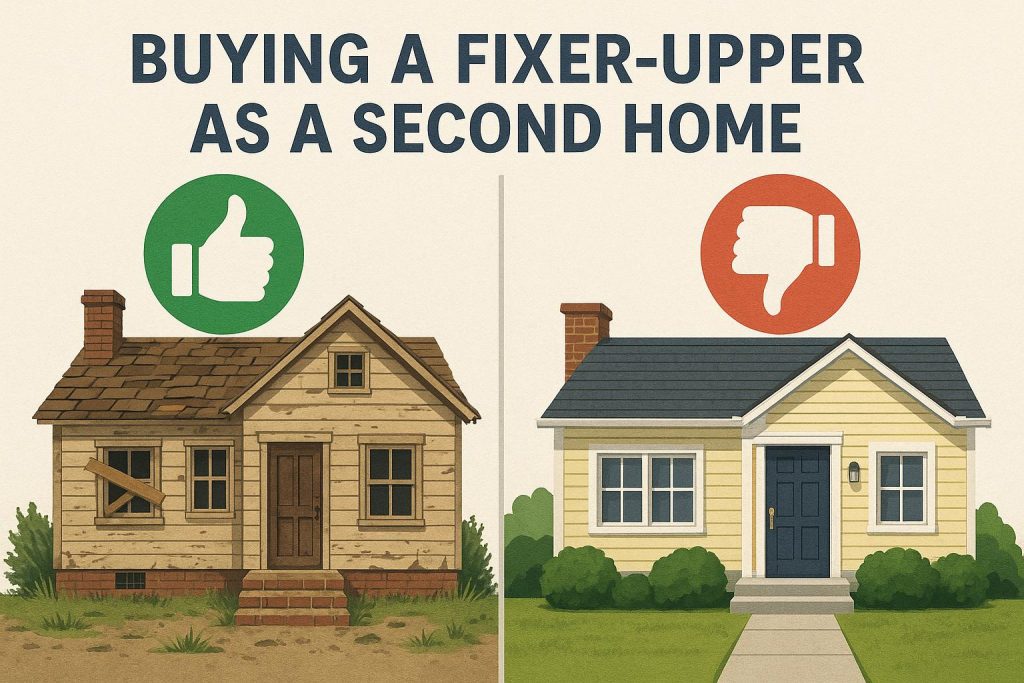The pros and cons of buying a fixer-upper as a second home

Understanding Fixer-Uppers
When contemplating the purchase of a second home, a fixer-upper frequently emerges as a compelling option. The term “fixer-upper” denotes a property that is in need of repair, renovation, or redesign. While some buyers might perceive these properties as challenges, others see them as opportunities for customization and potential investment rewards.
Potential Advantages of Buying a Fixer-Upper
Affordability: A major advantage of acquiring a fixer-upper is its lower initial cost in comparison to a move-in-ready home. Properties that require substantial work are often priced lower, making them appealing choices for those working with a limited budget. In urban areas where property prices can be prohibitive, a fixer-upper can be an accessible option that enables buyers to enter the market.
Investment Potential: Fixer-uppers offer substantial investment potential. By implementing strategic renovations and enhancements, owners have the opportunity to significantly boost the property’s market value. Popular renovations, such as updating kitchens and bathrooms or improving curb appeal, can yield high return on investment. In addition to selling at a higher price, owners could also take advantage of rental opportunities, thus generating passive income.
Customization: Purchasing a fixer-upper provides a blank canvas for customization. Owners have the freedom to modify the home according to their tastes and lifestyle needs. From selecting design elements and finishes to altering the layout, a fixer-upper allows for a highly personalized living space. This flexibility can result in a home that reflects the owner’s personality and enhances their quality of life.
Reduced Competition: Due to the work involved, fixer-uppers generally attract fewer bidders. This reduced competition can lead to easier negotiations and potentially more favorable terms for the buyer. With fewer buyers contending for the same property, there is often room for negotiation, making it possible to further lower the purchase price or negotiate better terms that suit the buyer’s preferences.
Challenges of Buying a Fixer-Upper
Renovation Costs: Despite the allure of a lower purchase price, the cost of renovations can accumulate rapidly. It is paramount to set a realistic budget and anticipate the possibility of unforeseen repairs that may arise as work progresses. Items such as structural issues, outdated electrical systems, or plumbing problems can quickly deplete renovation funds. Knowledge of potential costs and meticulous budget planning are essential to avoid unintended expenses.
Time Commitment: Undertaking renovations demands a significant investment of time, energy, and patience, especially if the property serves as a second home where the owner cannot visit regularly. Managing contractors, selecting materials, and dealing with unforeseen delays can be taxing. It is beneficial for prospective buyers to realistically assess their ability to manage these factors, especially when juggling other personal and professional commitments.
Potential for Overcapitalization: There is always a danger that the cost of improvements will surpass the resale value of the property. Buyers must clearly understand the local real estate market and seek expert guidance before engaging in major renovations. Overcapitalization may result in financial losses when the property is eventually sold. Hence, it is crucial to only make improvements that provide added value within the context of the local market.
Finding Reliable Contractors: Securing skilled and reliable contractors can be a daunting task, particularly if the second home is located in a less familiar area. Ensuring the quality of workmanship is vital to maximizing the property’s potential. Buyers should take the time to research and vet contractors thoroughly, checking references and portfolios, to ensure they hire professionals who can deliver on their promises and adhere to agreed timelines.
Conclusion
Purchasing a fixer-upper as a second home brings with it an array of opportunities and challenges. Prospective buyers must balance the appeal of affordability and potential for customization against the demands of time, effort, and monetary investment. Conducting in-depth research, establishing a realistic budget, and seeking advice from real estate and renovation professionals are vital steps in determining whether a fixer-upper represents a suitable investment. With the right approach, a fixer-upper can transform into a home that provides sustained satisfaction and financial rewards. For further information on purchasing a fixer-upper, consider consulting real estate resources and local market analyses.
